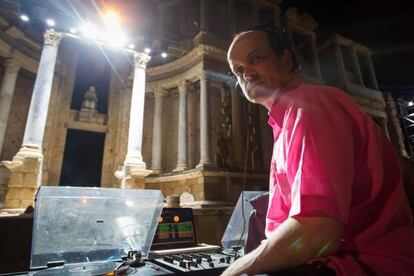Remixing Euripedes
British DJ Matthew Herbert provides the soundtrack to an unusual version of a classic Greek tragedy confronting audiences in Mérida’s Roman theater

Sex, wine and electronic music performed live by DJ Matthew Herbert — a potent and heady cocktail being served up in Mérida until Sunday night. The venue is not, however, a discotheque or bar. Instead the backdrop is the Extremaduran capital’s impressive, 2,000-year-old Roman theater, which is currently hosting the city’s 58th International Classical Theater Festival.
The unusual combination of Greek tragedy and electronic beats is at the service of a production of Euripedes’ play The Bacchae, which investigates the myth of Dionysus, the deceitful god of wine, and the despotic King Pentheus of Thebes.
Surrounded by his faithful Bacchantes — female worshipers who devote themselves to rituals of alcohol and lust — Dionysus, the offspring of Zeus and a human woman whose death he wishes to avenge, is the possessor of the key that opens the door to the transcendental. And the catapult to this state of sublimation is music to the rhythm of which his followers dance, immersed in the narcotic state into which he has induced them.
“Reading Euripedes’ words. what kept coming into my head was the night and partying,” explains Domingo Cruz, the actor who plays Pentheus, as well as the brains behind this unusual mix of classical drama and modern music.
Electronic music, with its designer drugs and unbridled dancing, you see, has a lot in common with these bacchanals in which Dionysus’ female followers lose their inhibitions. Underpinned in the “energy and in feeling more than in the text” — according to Críspulo Cabezas, who plays Dionysus — the production aims to stir the audience’s emotions via the fusion of the sight of the actors’ bodies in magnetic movement with the sound of the melodies created by Herbert.
There throughout nearly the play’s whole hour-and-a-half running time, these were composed around sounds made by the actors, who Herbert recorded rubbing and hitting themselves and groaning in pleasure and pain. “It’s a hybrid of human and electronic experience,” Herbert explains. It’s a mixture that enters the ears sometimes as a kind of dark and ecstatic murmur and other times as a sharp and numbing rhythm.
What we see and hear are the result of months of work, during which time Herbert and the production team passed images and sounds back and forth between the UK and Spain, without ever coinciding. The first time Herbert saw the production and its Roman theater backdrop was the day before the premiere, during the dress rehearsal.
“The form is much clearer to me now,” he says, “as well as the sense of tension, because trying to maintain it over 90 minutes is difficult.”
In front of the proscenium arch where Herbert will be stationed with his mixing desk during all the performances, a deranged sexuality, guided by an almost animalistic fury, dominates the instincts of a cast at the mercy of feminine drives. “People who see it won’t go away with a very clear idea of what they have seen,” says Cabezas. “It is a risky bet — very powerful, but you have to come with a new idea.”
As the promoter, it’s Cruz who should perhaps feel the most uneasy about the reaction of spectators accustomed to seeing more canonical versions of the classic texts.
“I would like the theater audience to have a musical experience, and the musical audience to have a deep theatrical experience,” he sighs.
Herbert offers his own take on what this unprecedented show, never before tried at the well-established Extremaduran theater festival, means. “It’s a show in which everything has an influence: the light, the text, the lighting, the fact that it is performed at night, in the open air. And of course, the architecture does a good part of the work. To that I add an atmosphere and I think that the result gives rise to something disturbing. A feeling in some way ghostly and at the same time beautiful.”
Tu suscripción se está usando en otro dispositivo
¿Quieres añadir otro usuario a tu suscripción?
Si continúas leyendo en este dispositivo, no se podrá leer en el otro.
FlechaTu suscripción se está usando en otro dispositivo y solo puedes acceder a EL PAÍS desde un dispositivo a la vez.
Si quieres compartir tu cuenta, cambia tu suscripción a la modalidad Premium, así podrás añadir otro usuario. Cada uno accederá con su propia cuenta de email, lo que os permitirá personalizar vuestra experiencia en EL PAÍS.
¿Tienes una suscripción de empresa? Accede aquí para contratar más cuentas.
En el caso de no saber quién está usando tu cuenta, te recomendamos cambiar tu contraseña aquí.
Si decides continuar compartiendo tu cuenta, este mensaje se mostrará en tu dispositivo y en el de la otra persona que está usando tu cuenta de forma indefinida, afectando a tu experiencia de lectura. Puedes consultar aquí los términos y condiciones de la suscripción digital.









































